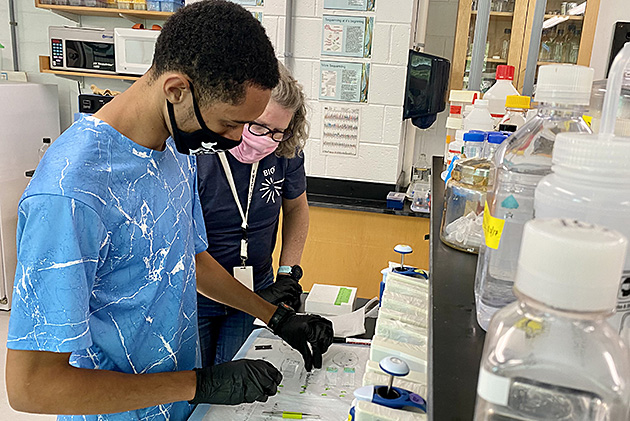Marine Benthic Ecology and Ecophysiology
Yvonne Sawall is the principle investigator of the Marine Benthic Ecology and Ecophysiology (MABEE) Laboratory at ASU BIOS. Her research focuses on shallow water coral reefs and seagrass meadows integrating aspects of physiology, ecology and oceanography. The overarching question of her research is how organisms and communities interact with their environment, while focusing primarily on key metabolic processes (photosynthesis, respiration and calcification) of foundation species (corals and seagrass). Understanding responses of corals and seagrass to persisting and changing environmental conditions is of paramount importance, since they form the basis of ecologically and economically important ecosystems, that are exposed to increasing threat of local and global stressors. Hence the mission of the MABEE lab is to elucidate potential impacts of global change on important coastal ecosystems by understanding strategies and limitations of keystone organisms and of benthic communities to respond to different environmental conditions.
Currently, the MABEE lab pursues three lines of research, which include
(i) organismal and community metabolism and their drivers in coral reefs,
(ii) coral thermal tolerance and thermal stress mitigation, and
(iii) seagrass functional processes and restoration.
The MABEE lab applies a number of state-of-the-art and cutting-edge approaches and is particularly invested in developing and applying in-situ technologies, such as the gradient flux technique to measure reef productivity and a novel fully automated in-situ incubation set up (BIO-RESORT) that allows in-situ metabolic rate and flux measurements. Instruments for continues monitoring of in-situ environmental conditions (Seabird SeapHOx, McLane RAS water samplers) are part of the lab, as well. Furthermore, a range of organism-specific methods are utilized to elucidate physiological mechanisms of stress responses that are conducted on living organisms (e.g, PAM fluorometry, incubations, growth rates, etc.) or on sacrificed tissue (e.g., pigment analysis, biomass determination, proteomics). The recently upgraded “Bermuda Marine Mesocosm Facility” (BMMF) supports novel and near-natural Climate Change research and more.
Funded projects at ASU BIOS (2016)
Current projects
2023 – 2026 NSF (National Science Foundation) Program: Environmental Sustainability. AU Coral project. Assessing the potential of artificial upwelling (AU) to mitigate coral bleaching during heat waves. Grant no.: #2320629. PI: Y Sawall; post-doc: Chloe Carbonne. Value: US$ 663,000.
2022 – 2025 Heising-Simons Foundation International. ENCORE – Enhancing coral resilience. PIs: Y Sawall, Samantha de Putron (BIOS), Hollie Putnam (University of Rhode Island), Gretchen Goodbody-Gringley (Central Caribbean Marine Institute); post-doc: Brett Jameson. Value: US$1,240,000
2021 – 2024 NSF Program: Chemical Oceanography. Eddy Reef project. Collaborative Research: In Situ Investigations and Historical Analysis of Eddy Impacts on coastal carbon chemistry and coral calcification. Grant no.: #2123697, PI: Y Sawall, co-PIs: Damian Grundle (BIOS/ASU), Nathalie Goodkin (American Museum of Natural History). Value: US$ 721,000
2021 – 2023 NSF Program: Infrastructure Capacity for Biological Research. Bermuda Marine Mesocosm Facility upgrade. Major improvements of the outdoor mesocosm facility at the Bermuda Institute of Ocean Sciences. Grant no.: 2129274, PI: Y Sawall, co-PI: Samantha de Putron (BIOS). Value: US$343,000.
Past projects
2020 - 2021 BIOS Cawthorn Research Innovation Fund. Advancements in understanding in-situ organism metabolic rates via innovative incubation chambers and an oxygen isotope tracer approach. PI: Y Sawall; co-PI: Tim Noyes (BIOS); in collaboration with Prof. (Emeritus) Michael Bender (Princeton). Value: US$ 150,000.
2017 – 2019 DFG (German Research Foundation) funded Future Ocean Cluster of Excellence. AU Reef. Is artificial upwelling a solution to coral bleaching threat? PI: Yuming Feng (GEOMAR); Collaborators: Y Sawall, Mario Lebrato (GEOMAR). Value: € 140,000 (no overhead included)
2017 - 2019 BIOS Cawthorn Research Innovation Fund. Improving reef calcification measurements and exploring dynamics of reef functioning. PIs: Y Sawall, EJ Hochberg, N Bates. Value: US$ 150,000.
2016 – 2019 NASA Earth Venture Suborbital-2 (EVS-2) Project. Coral Reef Airborne Laboratory (CORAL). PI: Eric Hochberg. Value: US$ 15,000,000 – Sawall was post-doc of the project
Students interested in pursuing a PhD in my lab, please contact Dr. Yvonne Sawall.
Program Contact
Dr. Yvonne Sawall
Assistant Scientist, Bermuda Institute of Ocean Sciences
Assistant Professor, School of Ocean Futures
School of Life Sciences
Senior Global Futures Scientist, Global Futures Scientists and Scholars
yvonne.sawall@bios.asu.edu
Laboratory Members
Chloe Carbonne (post-doc)
Brett Jameson (post-doc)
Roderick Bakker (Technician)
Moriah Kunes (co-supervised PhD student, Princeton Univ.)
Shalimar Giovanna Moreno (co-supervised PhD student, East Carolina Univ.)









